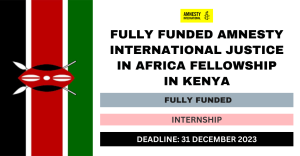The Fully Funded Amnesty International Justice In Africa Fellowship in Kenya is open for young African professionals.
Recommended
Building on the success of our International Justice in Africa Fellowship (2022-2023), Amnesty International announces its second edition. The Fellowship seeks to enhance the diversity of representation in the field of international justice by offering an opportunity to young African professionals (early to mid-career practitioners and scholars) based in Africa to work on international justice issues and mechanisms. Fellows benefit from knowledge, skills, and experience transfer, practical exposure to international justice spaces and forums, and the opportunity to engage and network with a variety of relevant actors, and stakeholders in the international justice movement. Fellows also participate in discrete research, legal analysis, policy discourse, and campaigning projects relating to international justice.
Fully Funded Amnesty International Justice In Africa Fellowship In Kenya 2024

Scholarship Eligibility
The eligibility of the Fully Funded Amnesty International Justice In Africa Fellowship in Kenya is stated below:
1. Citizen of the African continent
2. Applicant should be an early to mid-career practitioner and scholar
3. The fellowship will take place in Dakar, Nairobi (Capital of Kenya)
Scholarship Benefits
The Fully Funded Amnesty International Justice In Africa Fellowship in Kenya will provide USD 36,774 per annum for Nairobi. EUR 39,600 per annum for Dakar.
Benefits include 37 days annual leave (inclusive of public holidays and grace days), a pension scheme, an employee assistance program, life assurance, and many more benefits designed to suit your own personal lifestyle. All of this, in a professional, engaging environment.
Others
MAIN RESPONSIBILITIES:
1. Assist with research activities on accountability for crimes under international law in Africa and elsewhere through desk research and drafting.
2. Assist with monitoring and analyzing international and regional developments on international justice issues.
3. Assist with developing advocacy positions and strategies on identified priorities relating to international justice.
4. Participate and contribute to relevant internal and external policy discussions pertaining to international justice issues and mechanisms.
SKILLS AND EXPERIENCE:
READ ALSO: MICHIGAN UNIVERSITY SCHOLARSHIPS USA
1. Good knowledge of and experience in the application of international law, including international human rights law, humanitarian law, and international criminal law is essential.
2. Ability to analyze accurately legal issues and apply legal reasoning in pursuit of developing a strategic response.
3. Ability to gather and process human rights-related information/related.
4. Ability to write clearly and concisely (without the need for significant editorial revision) and proofread research, campaign, and advocacy materials.
I hope you find this article helpful.